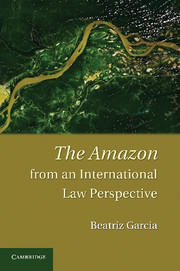Book contents
- Frontmatter
- Contents
- List of Maps and Figures
- List of Tables
- Preface
- Acknowledgments
- Abbreviations and Acronyms
- 1 Introduction
- 2 The Characteristics of the Amazon Region
- 3 The Origins of Regional Cooperation in the Amazon
- 4 The 1978 Amazon Cooperation Treaty
- 5 Regional and Subregional Organizations
- 6 Other Legal Instruments Adopted by the Amazon States Inter Se
- 7 Multilateral Treaties and Global Actors in the Amazon
- 8 Positive Incentives for Protecting the Amazon
- 9 The Legal Status of the Amazon
- 10 General Conclusions
- Bibliography
- Index
5 - Regional and Subregional Organizations
Published online by Cambridge University Press: 04 February 2011
- Frontmatter
- Contents
- List of Maps and Figures
- List of Tables
- Preface
- Acknowledgments
- Abbreviations and Acronyms
- 1 Introduction
- 2 The Characteristics of the Amazon Region
- 3 The Origins of Regional Cooperation in the Amazon
- 4 The 1978 Amazon Cooperation Treaty
- 5 Regional and Subregional Organizations
- 6 Other Legal Instruments Adopted by the Amazon States Inter Se
- 7 Multilateral Treaties and Global Actors in the Amazon
- 8 Positive Incentives for Protecting the Amazon
- 9 The Legal Status of the Amazon
- 10 General Conclusions
- Bibliography
- Index
Summary
The Amazon States participate in different regional and subregional organizations. Although they are all members of the 1978 Amazon Cooperation Treaty (ACT), they are also members of other regional or subregional organizations such as the Organization of American States (OAS), the Andean Community (CAN), and the Caribbean Community (Caricom). For example, although Brazil (and probably soon Venezuela) is part of the Common Market of the South (Mercosur), Guyana, and Suriname participate in Caricom, whereas the Andean countries (Bolivia, Colombia, Ecuador, and Peru) are members of CAN.
Over the last years, these organizations have developed their normative and institutional frameworks by adopting legal instruments, such as treaties, decisions, resolutions, and plans of action, and by creating permanent bodies, some of which are competent to adopt binding decisions that can be directly applicable in the member States' national legal systems. Virtually all of those organizations have developed bodies of law on different aspects of environmental protection, for example, climate change, forests, and freshwater. The legal instruments developed by such institutions are applicable in the Amazon States' territories, including their respective Amazonian territories, and are, therefore, part of the international legal system of the Amazon.
In addition to the regional and subregional organizations in which the Amazon States participate, other actors at the national level play a crucial role in the protection of the Amazon.
- Type
- Chapter
- Information
- The Amazon from an International Law Perspective , pp. 127 - 150Publisher: Cambridge University PressPrint publication year: 2011



